- Home
- Conn Iggulden
Stormbird wotr-1 Page 9
Stormbird wotr-1 Read online
Page 9
‘You must be Princess Yolande, my dear. I am at your service, of course,’ he said. His eyes came back to Margaret and he bit his lower lip.
‘I wonder if you would be so good as to grant me a word in private, my lady? I have some news you must hear before the ceremony.’
Margaret looked up to see her father and King Charles exchanging a confused glance.
‘What is this, Lord Suffolk?’ René said, bustling forward. ‘It is not seemly to delay the ceremony. Where is the bridegroom? Is he close by?’
Margaret’s heart sank as her father spoke. The English king was not there? She had visions of returning unwed to Saumur Castle, the subject of mockery and sly whispers for the rest of her life. She suddenly wanted to cry and felt Yolande’s hand take hers and squeeze it in silent support.
‘Your Majesty, my lord Anjou, I have some distressing news. Would you please escort your daughter out of the sun, into the church? It is not for all ears.’
Suffolk had grown red-faced as he spoke, looking as if he was about to burst with all the public attention focused on him. He was the first to look up when there was a clamour and a crash from the direction of the cathedral main door. Margaret saw an expression of deep relief come to Suffolk’s face when Derry Brewer came out of the gloom and skidded to a stop. There were servants passing through the crowd with jugs and precious glasses of white wine. Derry snatched one as he passed and strolled on towards the carriages in their half-circle.
‘Master Brewer!’ Suffolk said, wiping sweat from his brow with a cloth.
Margaret caught a glimpse of another tall lord turning sharply at the name and striding through the crowd towards them.
‘What a beautiful day for a wedding,’ Derry said in English, emptying his glass in one long draught. He bowed to the French nobles watching him with suspicion. ‘Your Majesties, Lord Suffolk. And these flowers of France must be princesses Margaret and Yolande.’
Derry bowed even deeper for them and kissed both hands with a smile that never left his face. He was sweating madly and looked as if he was trying to control his breathing, Margaret realized. Was he that excited to see them? It looked almost as if he had just been running. The nobles swirling around them were already whispering questions to each other.
Suffolk reached out and took Derry by the arm, growing even more flushed with strain and the heat.
‘I was just explaining, Master Brewer, that we should move to a private place for a moment before the ceremony.’
‘Excellent,’ Derry replied. As a servant passed, he exchanged his empty glass for another and sank that as well in three gulps. ‘It’s far too hot out here. Ah, Lord York! What a pleasure it is to see you so hale and hearty on such a day.’
To Margaret’s eyes, Lord York was much more the way she expected an English lord to look. He was tall and lithe, with a stern, square face and black hair cut short. His dark eyes flashed as he approached and all around them fell silent, sensing a threat like heat coming off the English nobleman. Once again, her father exchanged a glance with King Charles, growing more and more worried by the moment.
‘Your Majesty, Lord René, Lord Suffolk,’ York said, bowing. ‘I am very pleased to see you here, Brewer. I would enjoy a chance to continue our last conversation later on.’
‘Oh, as you wish, my lord. But today is not about our grubby little concerns, now is it? It is a day of celebration, with two great cultures joined in the promise of youth.’
His face still shining with sweat, Derry beamed at them all, clearly delighted at something. Margaret had followed the English words with difficulty and she looked from one to the other. Suffolk had spoken kindly enough and she found herself liking him. Lord York had not even acknowledged her.
‘This way, my lords, ladies. Let us take refuge from the sun in the cathedral.’
Derry led the small group to the open doors, raising his glass to a cluster of panting English soldiers as he went. They glared at him, following his every step with cold eyes.
The inside of the church was like a cool breeze after the hot sun. Margaret breathed deeply, worried she might faint. She leaned on Yolande as the strange little assembly turned and waited to be enlightened.
Derry dabbed his forehead with a fine cloth before he spoke, very aware of the attention focused on him. He knew all the months of planning would come to nothing if he botched this one speech. He raised his head, tucking away the cloth.
‘I’m afraid there is a small difficulty, my lords. King Henry was taken ill last night. It is nothing mortal, but even with purging it will not pass in time. Against his will, he has been forced to return to Calais and from thence to England. He is quite unable to attend and can only send his most abject apologies to Princess Margaret and her father.’
‘A small difficulty?’ King Charles said in stupefaction. His English was excellent, Derry noted, though the accent was thick enough to carve. ‘Have you any concept of the work that has gone into this day? Now you tell me your king is ill? It is a catastrophe!’
‘Your Majesty, all is not lost,’ Derry replied. ‘I have specific instructions from King Henry. This is a problem within the powers of men to solve.’
‘You have no bridegroom!’ Lord René expostulated. ‘How will you solve that?’
‘You cut straight to the heart of the matter, Lord Anjou,’ Derry said. His smile had not faltered. ‘Kings are not as other men, thank God. Lord Suffolk here has King Henry’s permission to exchange the vows on his behalf. The wedding will go ahead in that form, with another ceremony in England at a later date. The truce and the exchange of lands will be secured.’
‘Exchange of lands?’ York said suddenly.
Derry turned to him, raising his eyebrows in surprise.
‘My lord York, I see the king has not told you every part of his plans, as is his right. Perhaps you should go outside rather than hear details that do not concern you.’
York gritted his teeth, the muscles on his jaw standing out in lines.
‘I will stay to hear the rest, Brewer. As commander of English forces in Normandy, I believe it does concern me.’
Derry let a moment of silence stretch, as if he were considering having the man thrown out. York flushed further under the combined scrutiny of the French king and Lord Anjou.
‘Very well, Lord York. Stay if you wish, but please allow me to discuss King Henry’s plans without further interruption.’
Margaret thought the thin English lord might explode with rage, but York mastered himself with a visible effort. She found herself drifting, her vision growing blurred with tears. Henry was not coming! Her English wasn’t good enough to follow all the quick conversation. Even as she was trying to understand the calamity, they seemed to be suggesting something else.
‘Excuse me, my lords, Your Majesty,’ she murmured as Derry talked. No one seemed to hear her. ‘Pardon, Father,’ she went on, giving up on English when her heart was tearing in two in her chest. ‘Is there to be no wedding today?’
It was Suffolk who turned to Margaret then, his face registering sorrow and concern. He spoke in fluent French as he replied.
‘My dear, I am very sorry. It is true King Henry cannot be here. I have his permission to exchange vows in his name. Such things can be done and it will satisfy certain other parts of the union agreement. You will be betrothed today, at least, and you will marry formally in England. I would not be the one to bring such news to you, my dear, but we have come too far to lose it all now. If you will permit me, I will stand in place of King Henry this day.’
Margaret stared, her mouth slightly open. She found the veil suddenly stifling and tugged it away from her face.
‘Milord, tell me on your honour that this is a real thing? Am I to be married today or not?’
Suffolk hesitated and Derry spoke for him.
‘It will be a formal exchange of vows, princess. Without a groom, it cannot properly be said to be a marriage, but it will be enough.’
‘But I see a
ring on Lord Suffolk’s finger!’ Margaret said, shaking her head. ‘How can he stand in a church and make solemn vows when he is already married?’
‘Kings make their own law, princess. If Henry wants it so — and if King Charles agrees that it will do — well, it will do.’
All eyes turned to the French king, who was listening in fascinated confusion.
‘Your Majesty,’ Lord René said quietly. ‘We have come so far. This is but a step.’
The king scratched his nose, thinking.
‘I have certain sealed agreements with your King Henry,’ he said. ‘Agreements that become active as soon as Princess Margaret is married. You say you will honour this … betrothal as a true marriage in those terms?’
‘I will,’ Suffolk and Derry said almost together.
The French king shrugged.
‘Then I am satisfied.’ He changed to rapid French to speak again to Margaret. ‘The English are gauche and clumsy, my dear, but if their king is ill, it is God’s plan and mere men can only bend. Will you accept these terms? It would honour your father.’
Margaret curtsied.
‘If it is your wish, Your Majesty.’
Tension seemed to flow out of the small group as she spoke. Lord Suffolk patted her awkwardly on the hand.
‘I think, then, that I should take my place at the altar, my dear. I see the bishop is waiting for the groom to come to the altar. He will surely believe I have led a terrible life to look so very old.’
He smiled down at her and Margaret’s eyes filled with tears at his attempt to be kind. She saw the Englishman wrestle a gold band from his finger and place it carefully into a pocket. She could see a white line where it had been for many years.
Before he moved to take his place in the pews, she saw Lord York lean in close to Suffolk. Though the thin lord smiled as he spoke, whatever he said made Suffolk grow pale in the gloom.
Yolande reached up to dab away Margaret’s tears before they could spoil the kohl on her lashes, then replaced the veil almost reverently. Margaret struggled to take a full breath. She was fourteen years old and she told herself firmly that she would not wilt or faint on her wedding day, or whatever it had become. In her silent thoughts, she vowed to have words with her English king when she met him at last. Leaving her alone at their own wedding ought to be worth at least a castle.
The thought made her chuckle and Yolande looked up in surprise. The rest of the men had dispersed to the pews and the crowd outside was coming in at last, looking nervously at her and whispering questions that could not be answered. At the end of the nave, William de la Pole had walked through the door in the black oak pulpitum that hid the mysteries of the altar and the choir from the congregation. Through that gap, she could see the Englishman’s wide back as he stood and waited for a princess of France. Margaret shook her head in disbelief.
‘This is a strange day,’ she muttered to her sister. ‘I find I am nothing more than a bauble, while they play games of power all around.’
She set her jaw, refusing to look as her father came to her side and took her arm. Yolande and her cousins fell into step behind her and the church filled with music as three harpists began to play. On her father’s arm, Margaret walked slowly down the nave, her head held high. They passed through the pulpitum screen together and the door was closed behind them. When Lord Suffolk looked back, he smiled to see such bravery in a girl so young. Whether by luck or God’s blessing, or perhaps the sheer chicanery of Derry Brewer, Suffolk thought King Henry had found a rare one to be his bride.
The bells of the Saint-Gatien cathedral rang out over Tours, a joyous sound that rippled on and on in complicated patterns that never repeated for the course of a full peal.
Derry watched placidly as the French princess came out and was escorted back to her waiting carriage with the bells and roaring crowd echoing all around her. She was smiling and weeping at the same time, which made Derry chuckle. If his own daughter had lived, she would have been about that age. The thought brought a stab of an old pain to his chest.
The French king and his most powerful lords came out to see the bride leave for Saumur Castle, the monarch already deep in conversation and surrounded by messengers running to and from the army waiting outside the city.
Derry’s thoughts were interrupted as a hand came down hard on his right shoulder. In the inns of east London, he’d have grabbed it and broken the small finger, but he resisted the impulse with an effort.
‘What have you done, in the king’s name, Derry Brewer?’ York hissed at him. ‘Tell me this is not so. Tell me that we haven’t just given up lands won back to good Englishmen by Henry of Monmouth.’
‘His son, our king, wanted a truce, Lord York, so yes, that is exactly what we have done,’ Derry replied. He removed the hand on his shoulder, deliberately squeezing the bones together as he did so. York grunted in pain, though he resisted the urge to rub his hand when he had it back.
‘This is treason. You will swing for this, along with that fool Suffolk.’
‘And the king at our sides, I suppose? Lord York, is it possible you have failed to comprehend the arrangement? Maine and Anjou are the price for twenty years of truce. Will you gainsay your own king in this? It is what he wanted. We who are his humble servants can only give way to the royal will.’
To his surprise, York stood back and smiled coldly at him.
‘I think you will discover that there are consequences to these games, Derry Brewer. Whatever you think you have accomplished, the news is out now. As your secret deals are heard, the country will know only that King Henry has given away territories won by his father — and by English blood, shed on the battlefields. They will say … Oh, I will leave you to work out what they will say. I wish you luck, but I want you to remember that I warned you.’ For a moment, York chuckled and shook his head. ‘Do you think they will go meekly, those Englishmen, just because a fat French lord points them back to Normandy? You have overreached yourself with your cleverness, Brewer. Men will die because of it.’
‘Are you selling lavender as well as prophecy? I ask because I would value a sprig of lavender and there are no gypsy women here.’
He thought York would lose his temper then, but the man merely smiled once more.
‘I have sight of you now, Derry Brewer. My men have sight of you. I wish you luck getting back to Calais, but I fear it is not with you today. All your bright magpie chatter will not serve you when we catch you up on the road.’
‘What an odd thing to say to me, Lord York! I will see you again in London or Calais, I’m certain. For the moment, though, the French king has invited me to accompany him on a hunt. I like him, Richard. He speaks English ever so well.’
Derry raised a hand to catch the attention of the French noble party. One of the barons saw and gestured in reply, calling him over. With a last insouciant raise of the eyebrows for York’s benefit, Derry strolled across to them.
Outside the town, the French army began to pack up its camp, ready to take command of more new land won in a morning than in the ten years before that day. Duke René was beaming as Derry reached the group. More than a dozen of his peers stood close around him, clapping him on the shoulders and calling their loud congratulations. To Derry’s surprise, the Frenchman had tears running down his pale cheeks. He saw Derry’s expression and laughed.
‘Oh, you English, you are too cold. Do you not understand I have my family land back today? These are tears of joy, monsieur.’
‘Ah, the best kind,’ Derry replied. ‘There was talk of a hunt when His Majesty invited me to accompany him?’
Duke René’s eyes changed subtly in the light.
‘I suspect His Majesty King Charles was amusing himself at your expense, monsieur. There will be no hunting of boar or wolves, not today. Yet His Majesty will accompany his army as they move north through my land. Who can say what English deer we will find shivering in my family fields and vineyards?’
‘I see,’ Derry said
, his good humour vanishing. ‘I suspect I will not join you after all, Lord Anjou. If you don’t mind, I will remain here for a time, while I make arrangements to return home.’
He watched Richard of York striding away to give orders to the thousand men he had brought south. They too would withdraw to Normandy. The duke had no choice at all. For a moment, Derry had a sickening sense that York was not the fool he thought he was. There were many English settlers in Maine and Anjou, that much was true. Surely they would not be foolish enough to resist? The agreements King Henry had signed allowed for the peaceful uprooting of English families in the French provinces. Yet the mood of the nobles all around him was indeed that of a hunt. They showed their teeth and he could sense a febrile excitement in the air that worried him. Derry could taste nervous acid in his throat. If the English in Maine and Anjou refused to go, it could yet mean a war. All the work he had put in, all the months of scheming, would be wasted. The hard-won truce would last no longer than frost in summer.
8
For three days, the French army and York’s soldiers shadowed each other, moving north through Anjou. Duke Richard’s men pulled far ahead after that, in part because the French king stopped and held court in every town. The royal party made a grand tour of the Loire valley, making camp whenever King Charles saw something of interest or wished to see a church with the bones of a particular saint. The rivers and vineyards stretching over many miles of land gave him especial pleasure.
Hundreds of Anjou families were evicted by rough French soldiers running ahead of the main army. In shock and despair, they took to the roads in carts or on foot, a great stream of suddenly beggared subjects that only grew each day. York pulled his men back to the new border of English land in France, picketing them on the outskirts of Normandy as the flood of evacuees kept coming, filling every village and town with their misery and complaints. Some of them called angrily for justice from King Henry for their losses, but most were too stunned and powerless to do more than weep and curse.

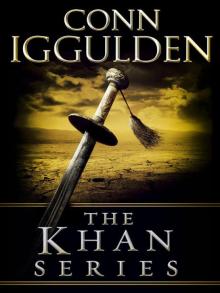 The Khan Series 5-Book Bundle
The Khan Series 5-Book Bundle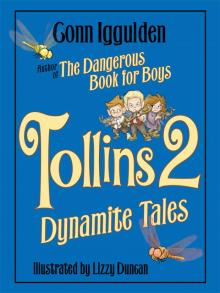 Tollins 2: Dynamite Tales
Tollins 2: Dynamite Tales Tollins: Explosive Tales for Children
Tollins: Explosive Tales for Children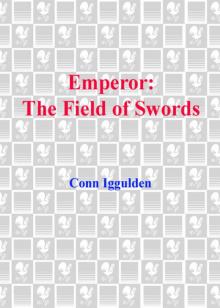 The Field of Swords
The Field of Swords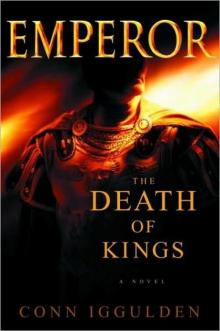 The Death of Kings
The Death of Kings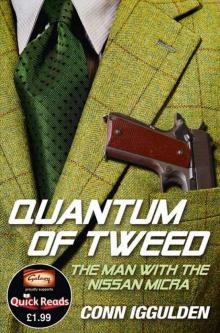 Quantum of Tweed: The Man With the Nissan Micra
Quantum of Tweed: The Man With the Nissan Micra Bones of the Hills
Bones of the Hills Genghis: Birth of an Empire
Genghis: Birth of an Empire The Gates of Rome
The Gates of Rome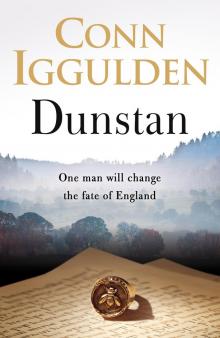 Dunstan
Dunstan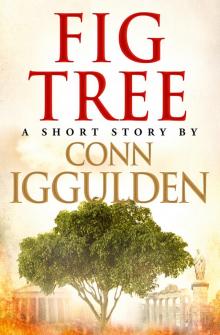 Fig Tree
Fig Tree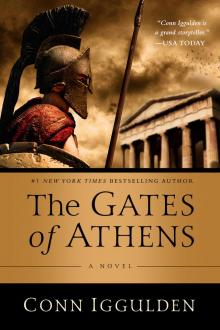 The Gates of Athens
The Gates of Athens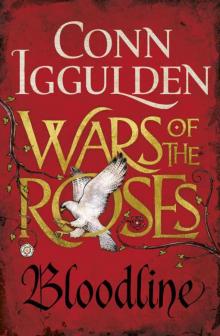 Stormbird
Stormbird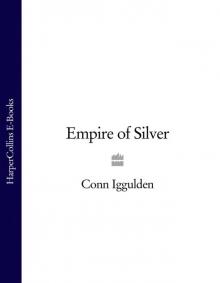 Khan: Empire of Silver
Khan: Empire of Silver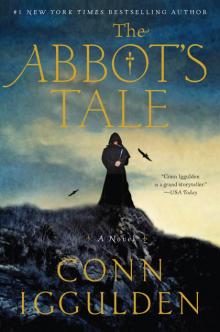 The Abbot's Tale
The Abbot's Tale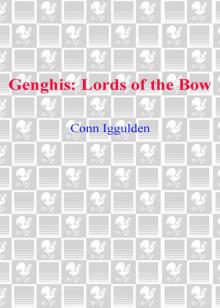 Gengis: Lords of the Bow
Gengis: Lords of the Bow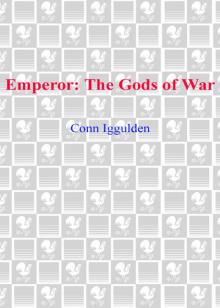 The Gods of War
The Gods of War Blackwater
Blackwater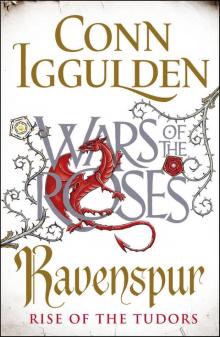 Ravenspur: Rise of the Tudors
Ravenspur: Rise of the Tudors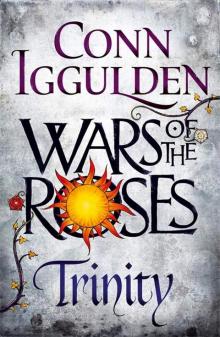 Wars of the Roses: Trinity (War of the Roses Book 2)
Wars of the Roses: Trinity (War of the Roses Book 2) The Gods of war e-4
The Gods of war e-4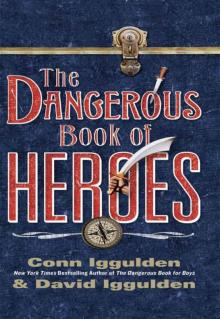 The Dangerous Book of Heroes
The Dangerous Book of Heroes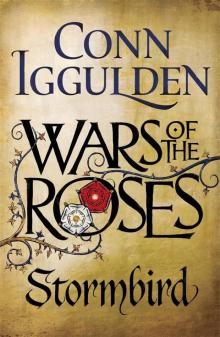 Stormbird wotr-1
Stormbird wotr-1 Emperor: The Death of Kings
Emperor: The Death of Kings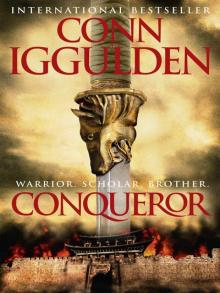 Conqueror (2011) c-5
Conqueror (2011) c-5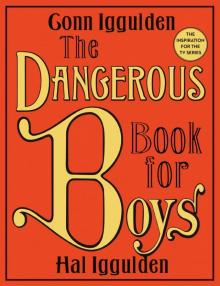 The Dangerous Book for Boys
The Dangerous Book for Boys Genghis Lords of the Bow
Genghis Lords of the Bow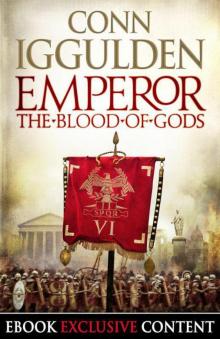 Emperor: The Blood of Gods (Special Edition) (Emperor Series, Book 5)
Emperor: The Blood of Gods (Special Edition) (Emperor Series, Book 5)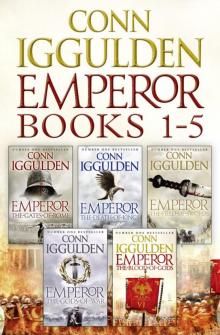 The Emperor Series: Books 1-5
The Emperor Series: Books 1-5 Lords of the Bow c-2
Lords of the Bow c-2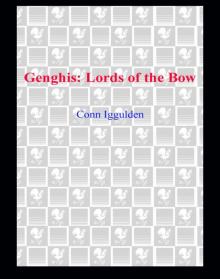 Lords of the Bow
Lords of the Bow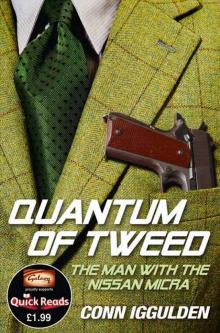 Quantum of Tweed
Quantum of Tweed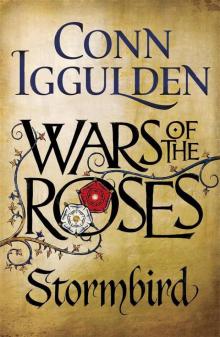 Wars of the Roses 01 - Stormbird
Wars of the Roses 01 - Stormbird Empire of Silver c-4
Empire of Silver c-4 Birth of an Empire
Birth of an Empire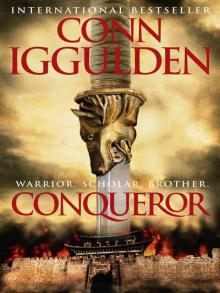 Conqueror (2011)
Conqueror (2011)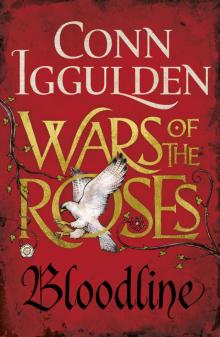 Wars of the Roses: Bloodline: Book 3 (The Wars of the Roses)
Wars of the Roses: Bloodline: Book 3 (The Wars of the Roses) Bones Of the Hills c-3
Bones Of the Hills c-3 Empire of Silver
Empire of Silver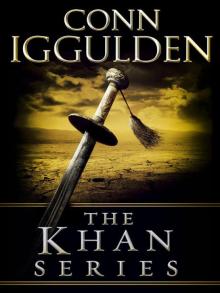 The Khan Series 5-Book Bundle: Genghis: Birth of an Empire, Genghis: Bones of the Hills, Genghis: Lords of the Bow, Khan: Empire of Silver, Conqueror
The Khan Series 5-Book Bundle: Genghis: Birth of an Empire, Genghis: Bones of the Hills, Genghis: Lords of the Bow, Khan: Empire of Silver, Conqueror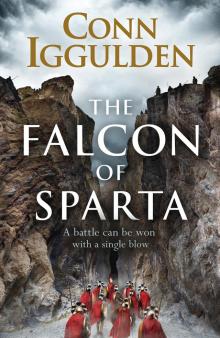 The Falcon of Sparta
The Falcon of Sparta Explosive Tales for Children
Explosive Tales for Children